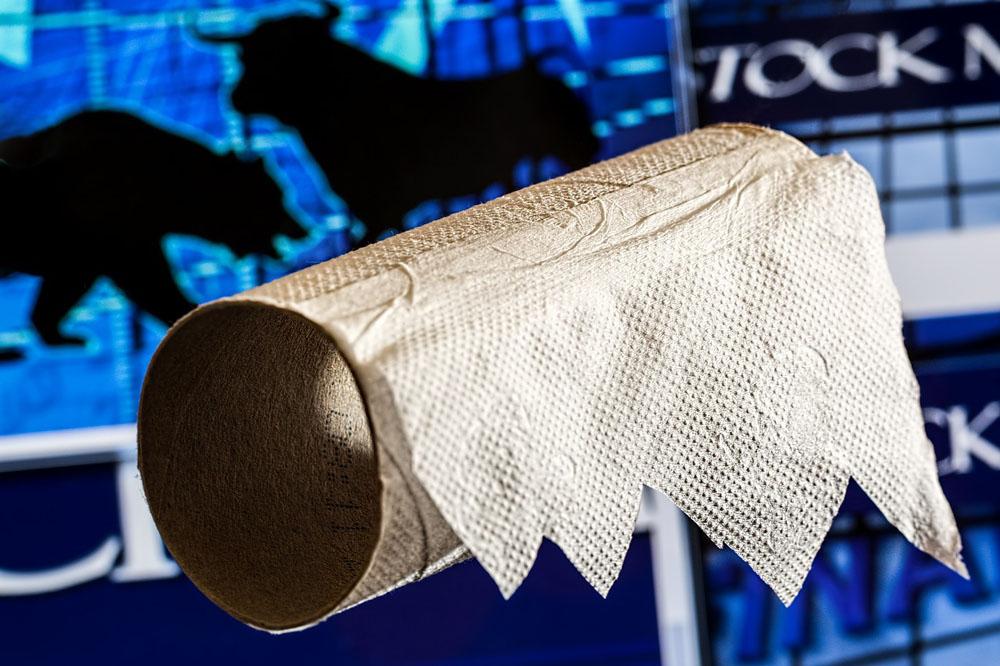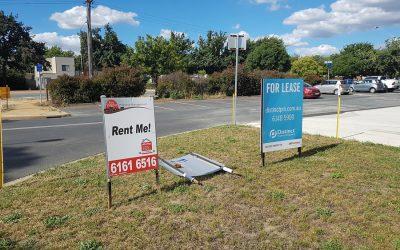
Sure, every recession is unique. A snowflake. And there are plenty of differences between 2020’s COVID-induced recession and the Great Recession of 2008-2009.
But that doesn’t mean we can’t learn from past recessions, particularly one as recent as the Great Recession.
Those who ignore history are doomed to repeat it. As you navigate the troubled water’s of the coronavirus recession, keep the following lessons from the Great Recession in mind. Who knows? They may just save you a boatload of money in the form of avoided investment mistakes.
Video Broadcast Version
Audio Podcast Version
Also available on iTunes, Stitcher, and wherever else you listen 🙂
Resources Mentioned in This Podcast & Video:

Brian Davis: It’s Brian Davis and Deni Supplee here, from Spark Rental.
Deni Supplee: Hey everyone!
Brian Davis: So, as you guys join us, let us know where you’re tuning in from. We always like to hear from you and make this more a conversation. It’s not just about us.
Deni Supplee: Yeah, we talk to each other enough.
Brian Davis: Everyday
Deni Supplee: So, last week we talked all about down payment racks and how to invest with less, seem to be received well and this week is going to be all about lessons from the 2008 great recession that applies today, right Brian?
Deni Supplee: Yeah, you know. recession is back with us unfortunately. And we can quite agree on how long that recession will take to recover, or how long we are in the recession and what shape the recession will take and UVW etc. But we are there, we are in the recession, so it’s not the exact same recession that we had twelve years ago but there are some parallels, so it’s worth taking a minute to walk through some of the things that we’ve learned from the last recession and applying for today. Because, those who don’t remember history are doomed to repeat it, right?
Deni Supplee: It’s interesting that there are so many unknowns in this but that has some background we can follow to at least assist.
Brian Davis: It’s a case of a different recession, different causes, but there are the same similarities and something is going to play out similarly again. So, without further ___01:55 One of the things that worth mentioning is that the recovery from recessions typically takes longer than the fall itself. So, the economy collapses faster then it rebounds and you can see that, in particular, with stocks. So in the average bear market and, by the way a ‘bear market’ is a stock market crash of more than 20%. So the average bear market stocks take 13 months from their previous high to reach their low point in the recession. And then they take 22 months to recover from that low point up to their previous high, so nearly twice as long.
Deni Supplee: It’s almost double the time.
Brian Davis: Exactly. So the fall happens faster than the recovery and that’s worth keeping in mind with any recession, with any stock market crash. Now, it’s not just about stocks. The recession impacts everything across the economy. So, take a look at unemployment rates! That takes even longer to recover than stocks, stocks actually recover rather quickly. Unemployment rates in the Great Recession, the low point for unemployment rate in a good way was 4.7% and that was in 2007 and then it jumped on to the double digits. And it wasn’t until 2016 that the unemployment rate made it back down to 4.7%. So, for context, the S&P 500 in the Great Recession, that took 16 months to reach its low point from its previous high. And then it takes 4 years to recover that previous high from it’s low point. So, it reached its low point in 2009 and then they recovered their previous high in 2013, but by the time that the S&P recovered it’s previous high in 2013 the unemployment rate was still over 8%, so the unemployment rate tends to take longer to recover than the stock market.
Deni Supplee: Now, with that being said, the unemployment rates today, because of different circumstances over all, what are your thoughts then on the recovery of these unemployment sequences?
Brian Davis: So, I’m under the impression that we will see a “Nike swoosh-shaped” recovery. You know with the very quick fall and the slow protracted upper recovery, so I think we are looking at several years to recover the jobs lost in this recession.
Deni Supplee: And the small business that just closed up.
Brian Davis: and the small business. That impacted us quite significantly, I mean one of our major partners went out of business in may, giving us almost no warning. And they were our software partner. So, it’s going to take probably years to recover the GDP lost, the jobs lost, all of these economic indicators. I suspect it’s going to be a long road to recover.
Deni Supplee: Whether we are adversely affected directly or indirectly, it still has an effect on us, on everyone.
Brian Davis: If most people are earning less money, then most people have lost money to expend in whatever business you’re in. So, there’s a whole trigger down effect throughout the economy. And we don’t know where the bottom is for the economy. The economy grew in late may and early June and then there was a resurgence in the Coronavirus and a lot of businesses had to close again. So we don’t know exactly where the bottom is here. We may not have hit the bottom, for GDP, for employment, for stocks. We just don’t know how this all is going to unfold so I’m in the midst of it.
Deni Supplee: who do you think get’s hit the worst?
Brian Davis: in most recessions (this was certainly true in the Great Recession) the working and middle classes get hit the hardest in recessions. So here is an example: it took roughly 10 years for a median incomes to recover from the Great recession. So they hit a high point in 2007 and then they dropped down and didn’t recover that income level until 2016. Now, we are adjusting for inflation, of course. But you have to! because, a dollar today is worth a lot less than a dollar ten years ago, and a lot less than a dollar ten years before that and so forth. So, it took ten years to recover the medium income in the United States from the Great Recession. And the same goes for net worth among the working and middle classes. So among the bottom 15% of Americans by net worth, it took around 10 years for them to recover from the Great Recession. So, for them they hit their peak at that time, around 2008, lost a bunch of money and didn’t recover the same asset level until 2017 for the bottom 15% of Americans that was much, much faster. The recovery was much faster for wealthier Americans, so among the top 10% of Americans, they actually recovered their assets by 2011. So, way faster than the bottom 15% of Americans. And by 2020, before the growth of our pandemic they had nearly double their net worth, from the Great Recession, so recessions always hit the working and middle classes harder, or more accurately, they hit everyone hard, but the recovery is much faster for wealthier Americans. Which, let’s be honest, that’s why Deni and I are always trying to encourage you all to build wealth, increase your savings rate.
Deni Supplee: Absolutely.
Brian Davis: Increase your assets, invest more, we want you to become, we want you to get in that top 10% of the country, by wealth.
Deni Supplee: And it’s something that people don’t…. I mean, that’s kind of stress, if you look at the numbers: 2017 some people were recovering, so what do they get? Three years?
Brian Davis: Right. In fact. So, these are all reasons why you want to be wealthier, life is better when you are wealthier. So, by the way.
Deni Supplee: I was just saying that it is better to cut off some of the stuff that you want now and do stuff toward your future, to protect it, to go through the stress that people are going through now.
Brian Davis: It’s one of the things we talk about, somewhere frequently is: You wanna save and investing during the good time, during expansionary economic periods, because there is always going to be a recession coming, it’s just a matter of ”when?” The economy is cyclical, right? So, in good times, everyone just goes out there and buys one-inch thick steak dinners every night, right? And there the recession comes and they are eating cold vegetables . So, you want to save and invest your money during the strong years (both for you personally and for the economy at large), so that you are prepared when the recession comes, because it will come. It’s like the Starks say on Game of Thrones ”Winter is Coming”. And they’re always right, sooner or later. Angela here says: ”Where’re you all located?” Well I’m in Brazil at the moment.
Deni Supplee: And I’m in Pennsylvania. We’re all over.
Brian Davis: I’m not from Brazil, of course, as you can tell from my accent. I’m from Maryland, Baltimore. But, Angela, let us know where you are located when you have a second here. Here is another lesson from the 08 recession, The Great Recession. Is that cash is king during recessions and one of the reasons for that is that: economic crises create opportunities, but you have to actually have capital in order to take advantage of these opportunities, so in the Great recession, the average US Home Price fell over 30%. The S&P 500 fell over 50%. So there is a huge opportunity to snatch up assets here, for sale, on a discount. But you have to actually have money to do it. and credit markets tightened up significantly during recessions, because so many more people are defaulting on their loans, so banks and lenders, they tighten up, they don’t want to lend money to just any Joe Shmoe anymore like they did during the good times. So you need to have wealth, you need to have cash on hand, you need to have capital to invest with, if your going to take advantage of the opportunities that came during recessions, this is one reason why the wealthier comes out ahead during recession, and the working and middle classes do not, they get hit so much harder. So, cash is king during recessions, you wanna be out to take advantage of this opportunity and you need capital to do it. Is a lot harder to borrow money to invest during recessions.
Deni Supplee: It’s funny cause I remember my grandparents, a lot older. So they were around in the Depression, and I remember that cash was like a big thing. And they didn’t even trust banks and stuff, for obvious reasons. And I never understood it as a kid, I understand it now, obviously. But they would hide cash around their house.
Brian Davis: Mattress money.
Deni Supplee: Yeah, and not just a few bucks, a significant amount of money that they would keep hidden, because that’s how they felt: you never knew.
Brian Davis: Right. Well in those days they didn’t have the FDIC, I mean that was implemented during the New Deal. So, now it is, of course, safe to leave your money in the bank, it’s insured by the federal government. But you do want your liquid capital during the recession, so that you can take advantage of these deeps in asset prices. Speaking of witch. Deni, talk to us a little bit of rents versus home values during recessions.
Deni Supplee: Well, they typically drop. It typically goes down significantly.
Brian Davis: Let me step in here, bail you out. If you look at rents over the last 50 or 60 years during recessions, rents tend to flatten out some, but they don’t generally drop. Home values, sometimes, drop a little bit during recessions, they don’t normally drop by a whole lot, in exception to that was the Great Recession, when home values did drop an average of 30% around the country. Now, keep in mind that all real estate is local, so that’s averaging out areas where homes didn’t drop in price at all and areas where they drop by 60% in value. So it’s hard to talk about the nation, where the average is. But rents tend to be pretty stable during recessions they tend to flatten but they don’t tend to drop. so that’s useful news for landlords and real estate investors, right? Who can count on their cash flow remaining somewhere consistent. That doesn’t mean their tenants won’t default on their rents during a recession, they lose their jobs, but at least the market rent is not likely to drop significantly during recession. Again, we are talking about nationwide averages.
Deni Supplee: Interestingly though for the areas like New Jersey, New York, my area Pennsylvania, all the cities like Filly, they are getting hit, people are living in the cities and running to the suburbs. So in the suburbs the rent has gone, in this pandemic, it has skyrocketed in my area. And the buying is still going on, it hasn’t really affected it this bad. But the city is definitely hurting.
Brian Davis: We actually read an article a few weeks ago about that de-urbanization trend that we’re seeing around the country, particularly in the largest nature areas in the country. So, I’m putting a link to that in the comments here for you to check it out. But we ran some of the data on that and people are in fact moving away from the largest cities in the country and moving to smaller cities, and of course smaller towns and rural areas as well. But check out some of the graphics there, there is some interesting data about the largest nature areas versus smaller cities and smaller nature, which actually bring us to our next point. the demand is stronger for affordable housing during recession and that’s intuitive, right? is kind of obvious, but is not just within a market, is also across the country, and that’s one of the reasons we see people leaving the most expensive cities in the US. And that’s also compounded to some Corona Virus related stuff. City living has not been as pleasant when you are trapped in your tiny little apartment and none of the business or amenities are open. But also, when more people are telecommuting we don’t have to spend $4.000,00/month for a tiny little apartment in San Francisco, because you work in a tech company there. You can work from anywhere, if you can telecommute. People are like, go spend $1,200/month to rent an apartment in Raleigh instead of $4,000 in an apartment in San Francisco.
Deni Supplee: Exactly.
Brian Davis: So, affordable housing tends to be more stable during recession, people who can’t afford a luxury home or are kind of stretching themselves to afford that luxury home, are going to downsize and downgrade housing during recession. So, keep an eye on affordable housing during recession, tends to be more resilient than the more expensive stuff.
Deni Supplee: How about taxes?
Brian Davis: Taxes. We are going straight into political territory here a little bit. But we are going to keep it by the numbers. So, in tax heavy jurisdictions, in areas that like o tax, you have to be really careful about tax highs during recession. because, obviously in a recession, local governments and state governments are hoping to see a drop in their ravenous, right? Because they make money from income taxes, from corporate taxes, from properties taxes, all that stuff which goes down and it all goes down during recessions. So these local governments see a drop in their ravenous, they have a choice on how to handle that, they can either, temporarily cut their spending, or they can raise taxes, right? In more liberal states, in more tax heavy states and cities you tend to see them rather than temporarily cutting spending, they tend to raise taxes and I watched this play out in my home state of Maryland in the Great Recession, so they were four new taxes that came about in Maryland in the wake of the Great Recession, tree out of those four were permanent, they didn’t go anywhere, and that’s the problem. In the wake of recession this tax heavy states and cities raise taxes but don’t cut down again when the recession ends, they just find other ways to spend their money. As opposed to cities and states that temporarily cut spending during recessions, they do readjust that back because everyone likes to spend money. Governments like to spend money, regardless of their political strikes, so that’s the issue. Areas that cut spending, that’s temporarily. Areas that raise taxes, that’s not temporarily, that becomes permanent. In Maryland for example, they raised the ceil tax from 5% to 6%, they raised their corporate income tax from 7% to 8.25%, they added an extra $1.00 per pack of cigarette tax. and then they also added a millionaire tax, which was an extra tax on op of the income tax for people of a net worth of a million dollars, and they wanted to keep that permanent, but it backfired so badly, that in the end up revoking it, so what happen was that. When they added that millionaire tax in the following year, they saw 30% drop in the number of millionaire fillers in Maryland. Some of that could have been the recession itself, the impact on people’s incomes. but some of that was people stopped filling their income taxes at all in Maryland, which suggested that they moved, right? They move out of state, to a state that didn’t tax as heavily. So a Bank of America and Merrill Lynch ran a study on this actually, and they asked $1 billion of tax revenue was lost in 2008 alone, due to the millionaire tax that Maryland tried to implement.
Deni Supplee: That was a bit of a backfire.
Brian Davis: Yeah, it was a total backfire. So Maryland ended up revoking that millionaire tax and it was quite controversial politically, of course.
Deni Supplee: You hear taxes go up, when do you ever see anything go down, really?
Brian Davis: That’s a good point. We got to be careful not to get too far into political territory here. But, in my experience, Republicans and Democrats alike love to spend public money, it’s just a matter of whether they borrow money to spend it, or whether they raise taxes to spend it, but everyone loves to spend money, less people are so thrilled about going through expending more responsibly, cutting expending.
Deni Supplee: Maybe they should learn FIRE, just kidding.
Brian Davis: Maybe they should. So, to circle this back around to recessions, this is another lesson from the Great Recession, from the 2008 recession, that people can learn from today is that in jurisdictions they like to tax. Be wary about taxes going up to cover the shortfall of tax revenues, is going to be inevitable from this recession. Because those tax highs will not be temporary, your state and city will find ways of continuing to spend that money even after the economy recovers. So beware of tex highs and consider moving somewhere with lower taxes. With, by the way, we ran an article a few months back about that as well, there is a correlation, between total tax burden (sales tax, excise tax, income tax, property taxes, on a statewide level) that is a correlation between total tax burden and where people are migrating in the US. Is not a perfect correlation, but there is a correlation. All right, I’m off my tax soap box.
Deni Supplee: Brian loves this stuff, thanks god.
Brian Davis: We’re gonna send another link down here. I wrote for BiggerPockets a couple of days ago, this has a lot of visuals and data and graphics in it, if you’re into that stuff, which I am. So you can take a look in some of the visuals for these data points and sets that we’ve been talking about. So check that out! Deni, anything you wanna add before we wrap it up, talking about lessons from the Great Recession that still apply today?
Deni Supplee: Just that we should learn from all of this. Is good to look at it and see the figures and everything. But I think that, if nothing else, recent stuff is going on teaches us that we need to be prepared, and like you said earlier, by doing that, maybe it will delay gratification now, when everybody else is running around like chickens without their heads on you got less stress. So, to me that’s important.
Brian Davis: If I’ve heard it once, I’ve heard it a thousand times from real estate investments who said ”men, I wish I’ve bought more properties back in 2011, 2012, 2013. When prices were so cheap. They say: Oh, I didn’t know how good the prices were, how good the bargains were. A lot of people didn’t have the capital to invest then because they were still recovering from the recession. But assets go on sale during recessions, you wanna have capital to invest.
Deni Supplee: just a reminder, next tuesday. We won’t be on next tuesday. I’m going away, my brain is in a vacation mood already. So I think we’re not gonna be here next tuesday.
Brian Davis: Let us know what you wanna hear about , both on our facebook live sessions every week and, of course in our blog. We would love to hear from you and what you wanna learn about.
Deni Supplee: Absolutely.
Brian Davis and Deni Supplee: Have a great week!























